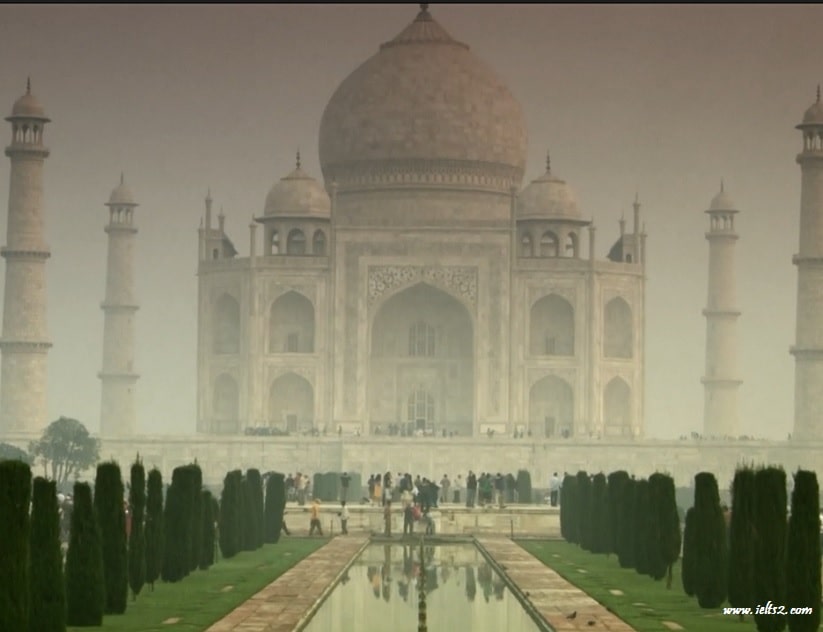نمونه سوالات اسپیکینگ آیلتس درباره تاریخ (پارت 1 2 3)
در این بخش بیش از 20 مورد از نمونه سوالات اسپیکینگ آیلتس نمره 9 درباره “موضوع تاریخ” را با هم میبینیم. این مجموعه از آخرین سوالات گزارش شده از سنترهای برگزار کننده آیلتس در ایران و خارج از کشور مربوط به پارت 1، 2 و 3 می باشند و شانس تکرار آن ها در آینده بالاست. در ادامه مطلب همچنین نکات گرامری، لغات و دلایل دریافت نمره 9 را به طور مشخص توضیح داده ایم تا راهنمایی برای علاقمندان باشد. 1000 نمونه سوالات اسپیکینگ آیلتس با جواب PDF پارت 1 2 3 پیشنهاد بعدی ما به شما عزیزان است.
نمونه سوالات اسپیکینگ آیلتس درباره موضوع تاریخ (پارت 1)
Do you like learning about history?
Yes, I find history fascinating because it helps us understand how societies evolved. Studying history allows us to learn from past mistakes and appreciate cultural heritage. I particularly enjoy learning about ancient civilizations like the Roman Empire and the Egyptian dynasties. History provides valuable insights into human nature and societal transformations. By understanding the past, we can make informed decisions for the future and preserve significant traditions.
Did you like history when you were in school?
Yes, I absolutely loved history in school. It was one of my favorite subjects because it told stories about real events and people. I enjoyed learning about great leaders, revolutions, and historical turning points. My teacher made the subject even more interesting by using engaging methods such as storytelling and interactive discussions. I believe history should be taught in a way that makes it relevant to modern times, helping students connect the past with the present.
What historical event do you find most interesting?
One of the most intriguing historical events for me is the Industrial Revolution. It was a transformative period that reshaped economies, societies, and technological advancements. The shift from agrarian to industrial economies revolutionized manufacturing, transport, and communication. I find it fascinating how this period laid the foundation for modern industrialization and urbanization, significantly improving living standards despite initial hardships.
Do you think history is an important subject for children to learn?
Absolutely! History is essential for children as it teaches them about their cultural identity and global heritage. It instills critical thinking skills and helps them understand cause-and-effect relationships. By studying history, children learn about perseverance, leadership, and ethical decision-making. It also fosters a sense of appreciation for the sacrifices made by previous generations, encouraging them to contribute positively to society.
Have you ever visited a historical site?
Yes, I have visited several historical sites, but my most memorable experience was visiting the Great Wall of China. Walking along its ancient paths, I was amazed by its grandeur and historical significance. It’s incredible how such an architectural masterpiece was built centuries ago. The visit deepened my appreciation for ancient engineering and the sheer determination of the people who constructed it. It was a truly unforgettable experience.
How do you usually learn about history?
I learn about history through various means, including books, documentaries, and museum visits. I enjoy reading historical novels and biographies because they provide deep insights into different eras. Documentaries bring history to life through visuals and expert commentary, making learning more engaging. Museums also offer hands-on experiences, allowing me to see artifacts and exhibits that provide a tangible connection to the past.
Do you prefer learning about local history or world history?
I enjoy both, but I find world history particularly intriguing. Learning about different cultures, civilizations, and historical events on a global scale gives me a broader perspective on humanity’s shared past. However, local history is equally important because it provides a deeper understanding of one’s roots and cultural identity. I believe a combination of both local and world history is essential for a well-rounded historical perspective.
Have historical movies or TV shows influenced your interest in history?
Yes, historical movies and TV shows have significantly influenced my interest in history. Well-researched productions like Schindler’s List and The Crown bring historical events to life in a compelling way. While dramatized for entertainment, they often spark curiosity and encourage deeper research into real historical events. However, I always ensure to verify facts through credible historical sources to differentiate between fiction and reality.
If you could meet a historical figure, who would it be?
If I could meet any historical figure, it would be Leonardo da Vinci. His genius spanned multiple disciplines, including art, science, and engineering. I would love to discuss his innovative ideas and creative process. Da Vinci’s ability to think ahead of his time is truly inspiring. Meeting him would be an incredible opportunity to understand his vision and how he approached problem-solving in such diverse fields.
How has history shaped the world we live in today?
History has profoundly shaped our world by influencing political systems, social structures, and technological advancements. Major historical events like wars, revolutions, and scientific discoveries have determined the trajectory of human progress. For example, the Renaissance sparked intellectual and artistic advancements, while the World Wars reshaped global alliances and geopolitics. By analyzing history, we gain valuable insights into how societies evolve and how we can shape a better future.
نمونه سوالات اسپیکینگ آیلتس درباره موضوع تاریخ (پارت 2)
Describe a historical event that you find interesting. You should say:
- What the event was
- When and where it happened
- Why you find it interesting
- How it has influenced the present world
Answer: One historical event that I find particularly fascinating is the Moon Landing in 1969. This monumental achievement marked a significant milestone in human history. It took place on July 20, 1969, when NASA’s Apollo 11 mission successfully landed astronauts Neil Armstrong and Buzz Aldrin on the Moon. Armstrong’s words, “That’s one small step for man, one giant leap for mankind,” resonate to this day.
What makes this event remarkable is the sheer ambition and technological innovation behind it. The space race between the United States and the Soviet Union had pushed scientific boundaries, leading to groundbreaking advancements in aerospace engineering, computing, and telecommunications. The mission was not just a victory for the U.S. but a testament to human perseverance and curiosity.
The Moon Landing has had a profound impact on the modern world. It inspired generations of scientists, engineers, and dreamers to pursue careers in space exploration. Moreover, the technology developed during this period laid the foundation for many modern advancements, including satellite communication and GPS technology. The event also symbolized the limitless potential of humanity when collaboration, ambition, and scientific inquiry converge.

نمونه سوالات اسپیکینگ آیلتس درباره موضوع تاریخ (پارت 3)
Why do people study history?
People study history to gain insight into past events, understand societal evolution, and learn valuable lessons from previous generations. History offers context to current affairs, allowing individuals to comprehend the roots of political conflicts, economic trends, and cultural transformations. Additionally, studying history fosters analytical thinking by encouraging people to assess multiple perspectives and question narratives. By understanding historical patterns, we can anticipate future developments and make informed decisions, ensuring progress without repeating past mistakes.
How can schools make history more interesting?
Schools can make history more engaging by incorporating interactive activities like storytelling, role-playing, and debates. Using multimedia resources such as documentaries and virtual reality experiences can bring historical events to life, making them more relatable. Additionally, educational field trips to historical sites allow students to experience history firsthand. Encouraging discussions about historical controversies also fosters critical thinking. If history is presented dynamically, rather than through rote memorization, students are more likely to develop a genuine interest in the subject.
Should history focus more on local events or global events?
Both local and global history are equally important. Local history helps individuals connect with their cultural heritage, fostering a sense of identity and pride. It also allows people to understand their community’s development and contributions. On the other hand, global history provides a broader perspective on human civilization, international relations, and interconnectedness. A balanced approach is necessary, as an understanding of both perspectives enables individuals to appreciate diversity while maintaining a strong connection to their roots.
What can we learn from history that is useful for the future? History teaches us valuable lessons about human nature, leadership, and decision-making. By studying past conflicts, we can understand the causes of war and work towards peace. Economic crises teach us about financial stability and sustainable growth. Moreover, history provides insights into social justice movements, guiding us in building more equitable societies. It also helps us recognize patterns, enabling policymakers to make informed decisions and avoid repeating past mistakes.
How has technology changed the way we study history? Technology has revolutionized the study of history through digital archives, virtual reality, and AI-powered analysis. Online databases grant access to vast historical records, making research more efficient. Virtual reality allows people to experience historical events and locations immersively. Additionally, AI helps historians analyze massive datasets, uncovering patterns that were previously undetectable. These advancements have made history more accessible, engaging, and accurate, transforming the way we interpret the past.
Is it possible to have an unbiased view of history? Achieving a completely unbiased view of history is challenging since historical narratives are shaped by cultural, political, and ideological perspectives. Every historian interprets events based on available evidence, but biases may influence their conclusions. However, by analyzing multiple sources, considering diverse viewpoints, and questioning dominant narratives, we can strive for a more balanced understanding. Critical thinking is essential in recognizing biases and forming well-informed opinions on historical events.
Should history be a compulsory subject in schools? Yes, history should be compulsory because it helps students develop critical thinking skills, cultural awareness, and a sense of identity. Understanding past events fosters informed citizenship, allowing people to make responsible political and social choices. It also cultivates empathy by exposing students to different cultures and historical struggles. While some may argue that history is less practical than STEM subjects, it is essential for building a well-rounded, knowledgeable society.
How do different cultures view historical events differently? Cultural perspectives shape how historical events are interpreted. A single event can be portrayed as a victory in one country and a tragedy in another. For example, colonial history is viewed differently by colonizers and the colonized. Education, media, and national identity influence historical narratives. By studying multiple viewpoints, we gain a more nuanced understanding of history and recognize the importance of acknowledging diverse experiences and interpretations.
How important is historical preservation? Historical preservation is crucial for maintaining cultural identity, educating future generations, and fostering tourism. Preserving monuments, documents, and artifacts allows people to connect with their heritage. Neglecting historical preservation can result in the loss of invaluable knowledge. Governments and organizations must invest in conservation efforts to protect historical sites from natural disasters, urbanization, and conflict. Digital archiving also plays a vital role in safeguarding history for future generations.
How can individuals contribute to keeping history alive? Individuals can help preserve history by supporting museums, reading historical literature, and participating in discussions about the past. Visiting heritage sites and advocating for their protection raises awareness about historical preservation. Additionally, engaging in oral history projects, where older generations share their experiences, helps pass down knowledge. Social media also provides a platform to share historical insights, ensuring that important stories remain alive and relevant in the modern world.
عوامل مؤثر در کسب نمره ۹ در پاسخها
برای اینکه پاسخهای بالا برای سوالات اسپیکینگ موضوع تاریخ به سطح نمره 9 در آزمون آیلتس برسند، چندین عامل مهم از نظر گرامر، واژگان، انسجام، و انسجام منطقی رعایت شدهاند:
۱. استفاده از ساختارهای گرامری متنوع و پیچیده
جملات مرکب و پیچیده (Complex & Compound Sentences)
استفاده از شرطی نوع دوم و سوم (Second & Third Conditional)
استفاده از افعال مجهول (Passive Voice)
جملات با عبارتهای ربطی و قیدهای وابسته (Relative Clauses & Adverbial Clauses)
این ساختارها نشان میدهند که نویسنده میتواند ایدهها را بهطور پیچیده و پیشرفته بیان کند.
۲. استفاده از واژگان پیچیده و آکادمیک (Lexical Resource – Band 9 Vocabulary)
عبارات و اصطلاحات خاص (Topic-Specific Vocabulary)
عبارات پیشرفته برای مقایسه و تحلیل (Advanced Comparative & Analytical Phrases)
۳. انسجام و پیوستگی (Coherence & Cohesion)
استفاده از عبارات ربطی متنوع (Cohesive Devices & Linking Words)
ارتباط معنایی بین جملات و پاراگرافها (Logical Flow & Progression of Ideas)
هر پاسخ دارای ساختار مشخصی است و ایدهها بهطور منطقی از یکدیگر پیروی میکنند.
۴. پاسخ دقیق و کامل به سوالات (Task Achievement & Relevance)
هر پاسخ بهطور مستقیم به سوال پاسخ میدهد و توسعه کافی دارد.
مثالها و توضیحات برای حمایت از ایدهها آورده شدهاند.
این ترکیب از ساختارهای پیچیده، واژگان غنی، انسجام منطقی و توسعه ایدهها باعث میشود که پاسخ به سوالات اسپیکینگ موضوع تاریخ در بالا در سطح نمره 9 در آیلتس باشند.
تعیین سطح رایگان اسپیکینگ ❤️
نمونه سوالات اسپیکینگ آیلتس درباره “موضوع تاریخ” پارت 1 2 3 را به همراه سمپل های نمره 9 آن ها با هم دیدیم. در ادامه نمونه سوالات دسته بندی شده اسپیکینگ آیلتس پیشنهاد آخر ما به دوستان گرامی هست. این نمونه سوالات اسپکینگ از پرتکرار ترین تاپیک های این بخش و همچنین جدیدترین موضوعات می باشند. این مجموعه توسط یکی از سایت های معتبر و فعال آیلتس تنظیم شده است. همچنین برای تعیین سطح و تعیین رایگان نمره اسپیکینگ و دریافت جدید ترین سمپل های نمره 9 در کانال تلگرام اسپیکینگ ما همراه باشید و به ادمین برای تعیین نمره اطلاع دهید.






